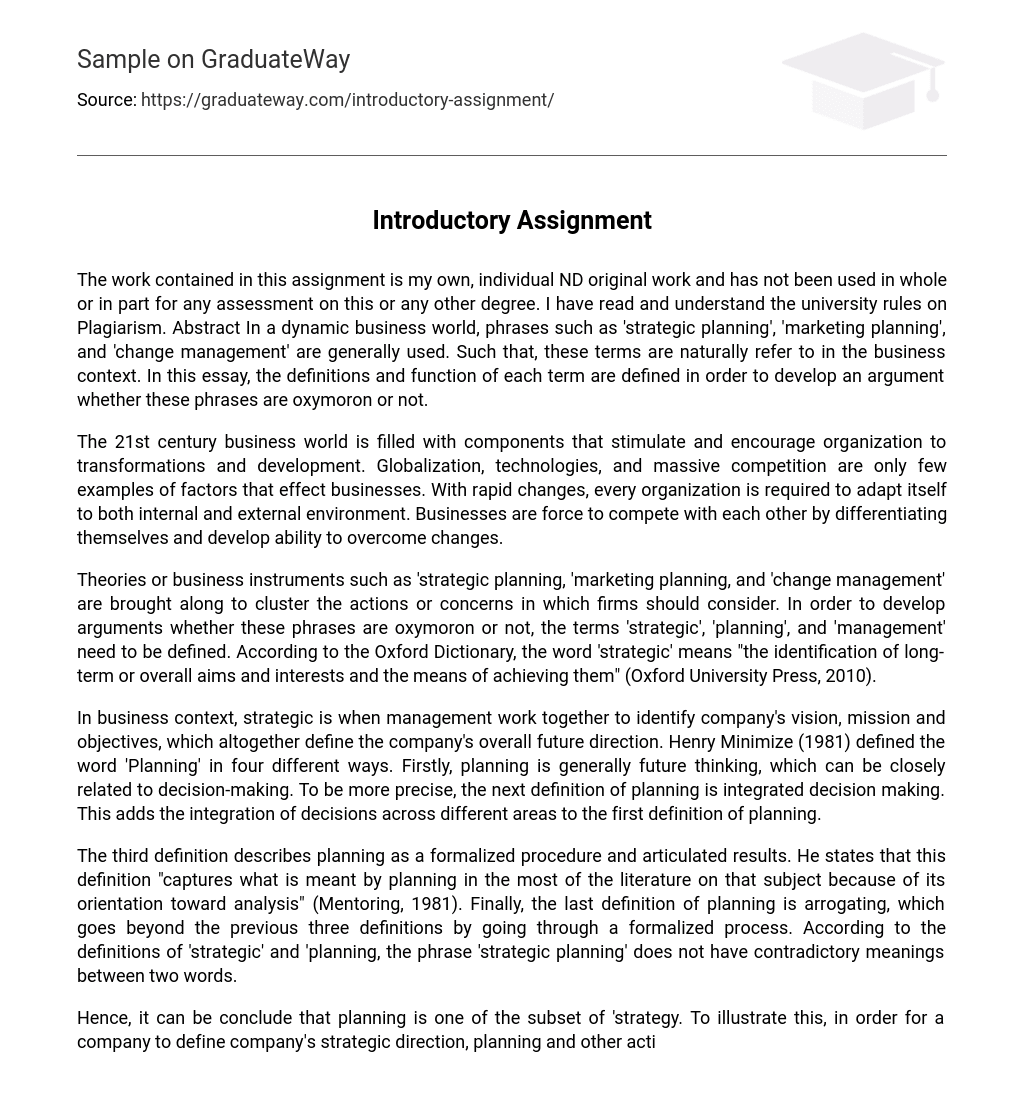The work contained in this assignment is my own, individual ND original work and has not been used in whole or in part for any assessment on this or any other degree. I have read and understand the university rules on Plagiarism. Abstract In a dynamic business world, phrases such as ‘strategic planning’, ‘marketing planning’, and ‘change management’ are generally used. Such that, these terms are naturally refer to in the business context. In this essay, the definitions and function of each term are defined in order to develop an argument whether these phrases are oxymoron or not.
The 21st century business world is filled with components that stimulate and encourage organization to transformations and development. Globalization, technologies, and massive competition are only few examples of factors that effect businesses. With rapid changes, every organization is required to adapt itself to both internal and external environment. Businesses are force to compete with each other by differentiating themselves and develop ability to overcome changes.
Theories or business instruments such as ‘strategic planning, ‘marketing planning, and ‘change management’ are brought along to cluster the actions or concerns in which firms should consider. In order to develop arguments whether these phrases are oxymoron or not, the terms ‘strategic’, ‘planning’, and ‘management’ need to be defined. According to the Oxford Dictionary, the word ‘strategic’ means “the identification of long-term or overall aims and interests and the means of achieving them” (Oxford University Press, 2010).
In business context, strategic is when management work together to identify company’s vision, mission and objectives, which altogether define the company’s overall future direction. Henry Minimize (1981) defined the word ‘Planning’ in four different ways. Firstly, planning is generally future thinking, which can be closely related to decision-making. To be more precise, the next definition of planning is integrated decision making. This adds the integration of decisions across different areas to the first definition of planning.
The third definition describes planning as a formalized procedure and articulated results. He states that this definition “captures what is meant by planning in the most of the literature on that subject because of its orientation toward analysis” (Mentoring, 1981). Finally, the last definition of planning is arrogating, which goes beyond the previous three definitions by going through a formalized process. According to the definitions of ‘strategic’ and ‘planning, the phrase ‘strategic planning’ does not have contradictory meanings between two words.
Hence, it can be conclude that planning is one of the subset of ‘strategy. To illustrate this, in order for a company to define company’s strategic direction, planning and other actions; such as research and other decision-making process need to be combined together. “Strategic planning is the systematic and more or less formalized effort of a company to establish Asia company purposes, objectives, policies, and strategies and to develop detailed plans to implement policies and strategies to achieve objectives and basic company purposes. (Akers, 1995) Marketing planning, on the other hand, is the combination of two words with different meanings. Marketing, according to Oxford Dictionary, is “the action of business of promoting and selling products or services, including market research and advertising” (Oxford University Press, 2010). Marketing requires great extent of decision-making; for instance, budget allocation for each marketing plan, and how to execute the advertising and Edie planning. These steps toward the marketing success all require ‘planning’ and ‘articulation of result’, in which company expects to generate profits in return.
Thus, marketing planning is “simply a series of activities in a logical sequence leading to the setting of marketing objectives and the formulation of plans for achieving them” (McDonald, 1992). ‘Marketing and ‘planning, albeit their distinctive meanings, are relate to each other under the business settings. Therefore, the phrase ‘marketing planning is also considered not an oxymoron. ‘Change Management’ is one of the essential tools for every organization to arrive in a dynamic business world. Change’ can be caused by myriad of both internal and external factors such as technological, staffing, environment, policies, and political (Caravan, 1996). Although, we cannot foresee what kind of changes are incoming, organizations can put on some plans to prevent or manage them to lessen the impact those factors have on the company. Uncertainties in today’s business world stimulate organizations to be prepared for changes. Change management, according to the Oxford’s Dictionary of Business and Management (2009), is “a systematic approach to dealing with OTOH planned and unplanned change in the organization.
A major part of change management is dealing with fear of or resistance to change in the workforce. The best strategy for dealing with such resistance is usually one of communication, participation, encouragement, and support”. Thus, the phrase ‘change management’ is not an oxymoron phrase. On the other hand, ‘management’ can be defined as a tool to deal with changes in factors that affect organizations. After investigating the definition of each phrases: ‘strategic planning’, ‘marketing planning, and ‘change management’, and their actual functions in management,





